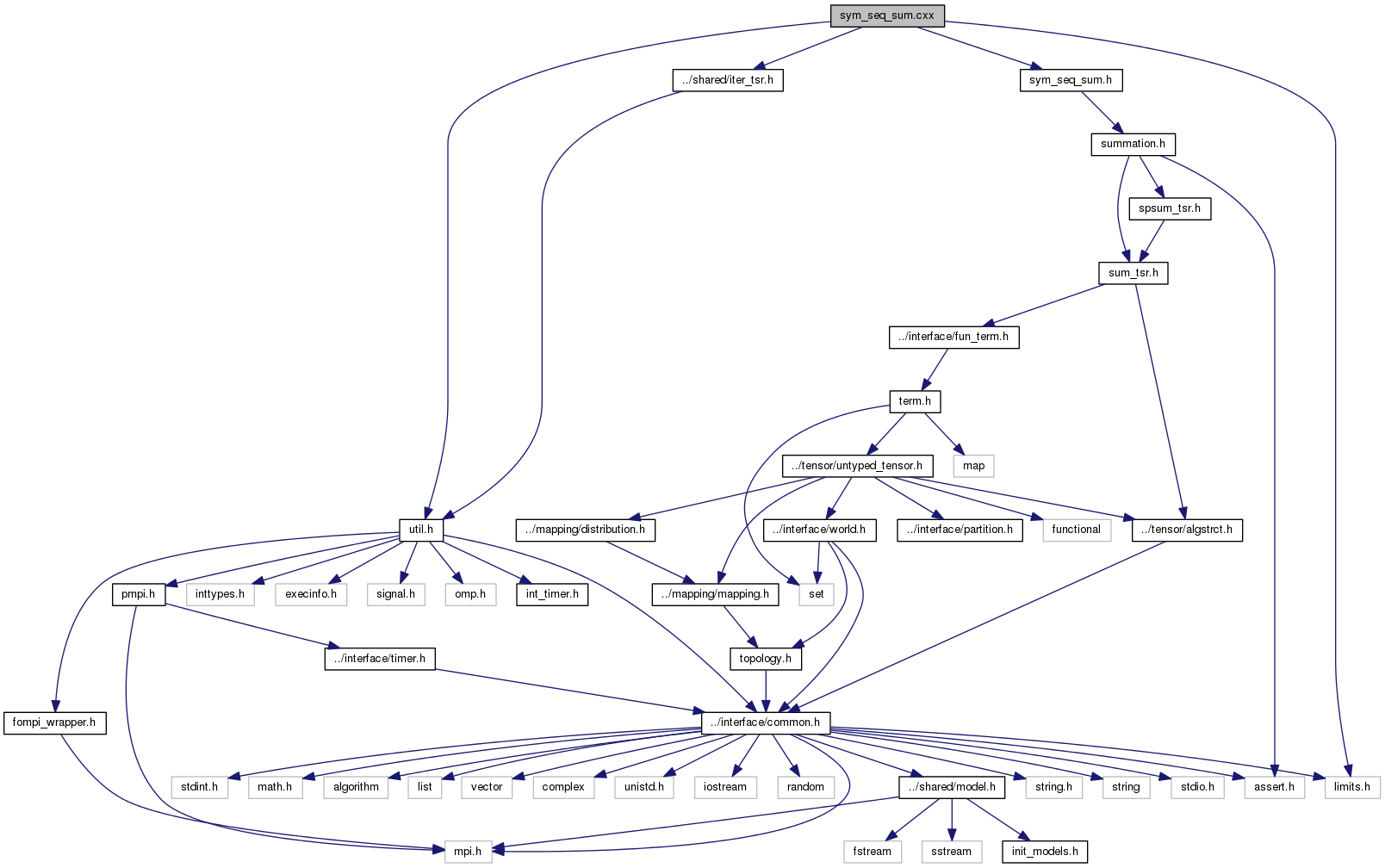|
Cyclops Tensor Framework
parallel arithmetic on multidimensional arrays
|
|
Cyclops Tensor Framework
parallel arithmetic on multidimensional arrays
|
#include "../shared/iter_tsr.h"#include "../shared/util.h"#include <limits.h>#include "sym_seq_sum.h"
Go to the source code of this file.
Namespaces | |
| CTF_int | |
Macros | |
| #define | SCAL_B |
| #define | SCAL_B_inr |
Functions | |
| template<int idim> | |
| void | CTF_int::sym_seq_sum_loop (char const *alpha, char const *A, algstrct const *sr_A, int order_A, int const *edge_len_A, int const *sym_A, int const *idx_map_A, uint64_t *const *offsets_A, char *B, algstrct const *sr_B, int order_B, int const *edge_len_B, int const *sym_B, int const *idx_map_B, uint64_t *const *offsets_B, univar_function const *func, int const *idx, int const *rev_idx_map, int idx_max) |
| template<> | |
| void | CTF_int::sym_seq_sum_loop< 0 > (char const *alpha, char const *A, algstrct const *sr_A, int order_A, int const *edge_len_A, int const *sym_A, int const *idx_map_A, uint64_t *const *offsets_A, char *B, algstrct const *sr_B, int order_B, int const *edge_len_B, int const *sym_B, int const *idx_map_B, uint64_t *const *offsets_B, univar_function const *func, int const *idx, int const *rev_idx_map, int idx_max) |
| template void | CTF_int::sym_seq_sum_loop< MAX_ORD > (char const *alpha, char const *A, algstrct const *sr_A, int order_A, int const *edge_len_A, int const *sym_A, int const *idx_map_A, uint64_t *const *offsets_A, char *B, algstrct const *sr_B, int order_B, int const *edge_len_B, int const *sym_B, int const *idx_map_B, uint64_t *const *offsets_B, univar_function const *func, int const *idx, int const *rev_idx_map, int idx_max) |
| void | CTF_int::compute_syoffs (algstrct const *sr_A, int order_A, int const *edge_len_A, int const *sym_A, int const *idx_map_A, algstrct const *sr_B, int order_B, int const *edge_len_B, int const *sym_B, int const *idx_map_B, int tot_order, int const *rev_idx_map, uint64_t **&offsets_A, uint64_t **&offsets_B) |
| int | CTF_int::sym_seq_sum_ref (char const *alpha, char const *A, algstrct const *sr_A, int order_A, int const *edge_len_A, int const *sym_A, int const *idx_map_A, char const *beta, char *B, algstrct const *sr_B, int order_B, int const *edge_len_B, int const *sym_B, int const *idx_map_B) |
| performs symmetric contraction with unblocked reference kernel More... | |
| int | CTF_int::sym_seq_sum_inr (char const *alpha, char const *A, algstrct const *sr_A, int order_A, int const *edge_len_A, int const *sym_A, int const *idx_map_A, char const *beta, char *B, algstrct const *sr_B, int order_B, int const *edge_len_B, int const *sym_B, int const *idx_map_B, int inr_stride) |
| performs symmetric summation with blocked daxpy More... | |
| int | CTF_int::sym_seq_sum_cust (char const *alpha, char const *A, algstrct const *sr_A, int order_A, int const *edge_len_A, int const *sym_A, int const *idx_map_A, char const *beta, char *B, algstrct const *sr_B, int order_B, int const *edge_len_B, int const *sym_B, int const *idx_map_B, univar_function const *func) |
| performs symmetric summation with custom elementwise function More... | |
| #define SCAL_B |
Definition at line 231 of file sym_seq_sum.cxx.
Referenced by CTF_int::sym_seq_sum_cust(), and CTF_int::sym_seq_sum_ref().
| #define SCAL_B_inr |
Definition at line 262 of file sym_seq_sum.cxx.
Referenced by CTF_int::sym_seq_sum_inr().